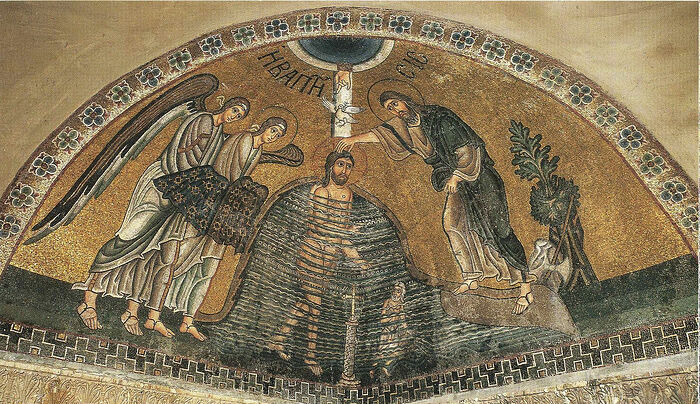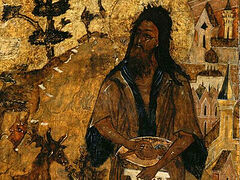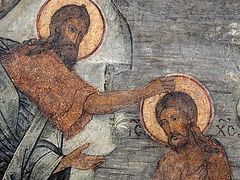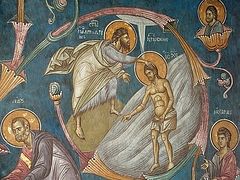In the name of the Father, and of the Son, and of the Holy Spirit!
Today, dear brothers and sisters, on the eve of Theophany, the Baptism of Christ, a great feast of the Lord, we are praying in а service that is long but amazing in its content, combining the reading of the Hours, and Vespers, and the Divine Liturgy of St. Basil the Great, and soon the clergy will leave the altar for the Great Blessing of the Waters, coming out to the troparion: “The voice of the Lord is upon the waters crying: ‘Come, one and all, receive the Spirit of wisdom, the Spirit of understanding, the Spirit of the fear of God, from Christ Who now has shone forth!’”
Today’s service is most reminiscent of the service on the eve of the feast of the Nativity of Christ, and today is also known as Sochelnik.1 The similarity of the services is explained by the fact that before the fifth century, it was customary to commemorate the Birth and Baptism of our Lord Jesus Christ on the same day and to call this feast Theophany, which spoke of the Incarnation of Christ in the world and the manifestation of the Most Holy Trinity in the waters of the Jordan.
On the banks of the Jordan, “the voice of the Lord upon the waters” was heard: At the Baptism of Christ the Savior, God the Father reveals Himself to His creation—to man, with the voice: This is My beloved Son, and the Holy Spirit descends upon Christ in a bodily shape like a dove. The Theophany of the Lord did not go unnoticed by men. After this manifest miracle, many began to looks more closely at this little-known (as they previously thought) thirty-year-old man from Nazareth of Galilee. Some became His disciples and, leaving their families and usual lives, followed after Him to hear His Good News, to drink the water from which no one will ever thirst again. And in the future, this water—the grace of the Truth of Christ—became a source of water flowing into eternal life for those who witnessed the Theophany in the Jordan.
Ho, every one that thirsteth, come ye to the waters, and he that hath no money; come ye, buy, and eat (Is. 55:1), the Prophet Isaiah calls. As the feeling of physical thirst is a manifestation of our nature, so spiritual thirst is natural to every man. Suffering and being tormented by the thirst for communion with God, we seek to meet God, we strive to draw near to Him, to fulfill His will and commandments. But let us not forget that before the Theophany in the Jordan, before the Baptism of the Holy Spirit, there was the baptism of John, when St. John the Forerunner baptized people who were thirsting for God with water for repentance.
That we might be accounted worthy of the appearance of God and the quenching of our spiritual thirst, we must be pure, cleansed of the bodily and spiritual contamination of sin and bad habits. We must repent, but not only in words, but we must strive with all our might to live as befits a repentant sinner. Instead of beating ourselves up and becoming despondent, we must constantly bear fruits worthy of repentance; otherwise, despite our declarations of repentance that we utter in prayer and in confession, we won’t be able to avoid the wrath to come. The fruits of repentance reveal whether it was sincere, and the change in our thoughts is shown only by a change in our way of life.
In today’s Gospel reading, we heard St. John the Baptist explain these fruits of repentance to those who had come to him at the Jordan to be baptized. The Pharisees and Sadducees—the social elite—did not ask any questions of St. John; they were sure that they knew the Law of Moses as well as he, and that they knew what to do or not do. But the common people—publicans and soldiers—who understood that they were living incorrectly, and, most importantly, aware that they must live better, aware of their own ignorance, sought to hear the counsel of a righteous ascetic, the counsel of a man of God. And the first question is that of the common people: “What should we do to bring forth fruits of repentance?” And the answer is given them: Be merciful, begin your amendment with works of mercy—whoever has two sets of clothing—meaning one is extra—give it away, or at least lend it to a poor man that he might warm himself. The Lord awaits mercy from us, not sacrifice, and the purpose of this mercy is to make us suitable for every good deed.
Then the publicans, that is, people who have authority over others, officials, collectors of the imperial annual income turn to St. John the Forerunner with the question: What shall we do? Their fruit of repentance is to not to demand anything extra, not to exceed their official powers, not to abuse their authority. St. Gregory the Theologian spoke about it very well: “Therefore, all rulers should first of all pay attention not to authority over subordinates in terms of position, but to equality with them in terms of the nature of their origin, and to be comforted not by the fact that they have command over those like them, but that in ruling over them, they have the chance to be useful to them… To seek to have our equal tremble before us is to rule against nature.”
And after the publicans, the soldiers ask their question: And what shall we do? These are not Jews brought up in the Law of Moses; these are people who are Gentiles by birth, but who believe in the One God. Usually, it’s rare for soldiers to set an example of piety. Even the justified killing of an enemy on the field of battle or the lawful execution of a criminal deprives a man of his inner peace and joy. To fill this oppressive void in their souls—a clear sign of thirsting for God—the soldiers await an answer from the prophet of God. And in response to their question, St. John the Baptist doesn’t call them to throw down their weapons and give up their service, but warns against the sins that soldiers often commit: Never wrong the people among whom they are quartered and over whom they are placed. “Do not offend anyone. Your job is to preserve peace and prevent evil among people, but not to offend anyone. Do not frighten people—for the sword of war, like the sword of justice, must be directed against those who work evil in defense of those who do good. Don’t be rude where you live, and don’t use threats to extort money from people. Don’t shed blood in times of peace; be courteous to all. Don’t slander people before the government to make them fear you; don’t rush to complain about each other to the authorities in order to take revenge on someone you have a grudge against; don’t plot to undermine your superiors in order to take their place; don’t take bribes.”
And again: Be content in everything, because discontentment makes people despotic and unjust. He who always thinks he doesn’t have enough won’t hesitate to take any illegal action to increase his wealth by deceiving others. This is a rule for all of us: to be content with our wages and make the best of what we have.
And when we repent, when we amend our ways and prove the change to our heretofore sinful life by our deeds, we bring forth fruits of repentance, we become merciful, meek, kind, grateful, and then we will hear the voice of the Lord upon the waters, which cries out, saying: “Come, one and all, receive the Spirit of wisdom, the Spirit of understanding, the Spirit of the fear of God, from Christ Who now has shone forth.” This voice is heard upon the waters, and it’s not only the Jordan—a small river in Palestine—that received the special grace of the manifestation of the Most Holy Trinity, having received the God-Man into its waters, but across the whole earth and on the sea the mystery of the Baptism of the Lord for the blessing of the nature of water by the invocation of the name of God was accomplished and is accomplished daily.
Let us come, dear brothers and sisters who thirst for God, who love Divine Truth and holy water; let us come to church for this great and holy water of the holy theophanies of the Great Blessing of the Waters.
But let us remember that if we do not want to appear as the spawn of vipers in the eyes of God and go into the eternal fire, then we must never forget the fruits of repentance. Let us show patience, generosity, meekness, gentleness, and kindness when receiving holy water, letting everyone go ahead of us and lovingly answering those who inquire of us.
On this day, the eve of the Theophany of the Lord, more than 1,600 years ago, St. John Chrysostom said the following:
Many proceed now to the Holy Supper on the occasion of the feast. But some approach not with trembling, but pushing, striking others, burning with anger, shouting, cursing, interrupting others, with great agitation… Tell me, what is disturbing you, man? What is bothering you? Needful things, of course, are calling you; at that hour when you are especially aware that you have things to do, do you especially remember that you are on earth and think about how you are treating people? But isn’t it characteristic of a stony soul to think that at such a time you are standing on earth, not rejoicing with the angels with whom you are singing a song of victory to God? This is why Christ called us eagles, saying: For wheresoever the carcase is, there will the eagles be gathered together (Mt. 24:28), so that we might ascend to Heaven, and soar on high on the wings of the spirit; but, like serpents, the offspring of vipers, we grovel on the ground and eat dust…
Let us imagine this, beloved, let us think about it, fearing the impending condemnation for it. Let us approach the Holy Sacrifice and all holy things, including holy water, with great piety, with proper reverence, that we might merit great favor with God, purify our souls, and receive eternal benefits, which may we all be granted by the grace and philanthropy of our Lord Jesus Christ, to Whom, together with the Father and the Holy Spirit, belongs all glory and honor and worship, both now and ever and unto the ages of ages. Amen.




